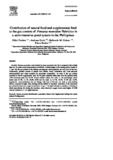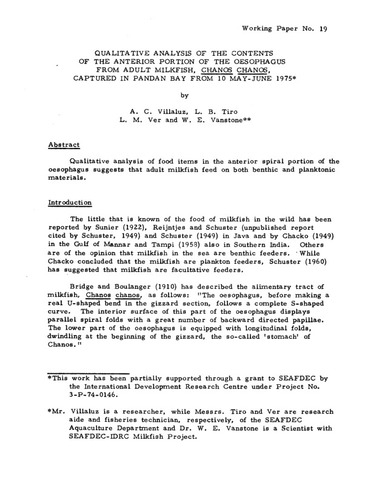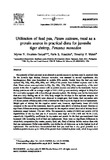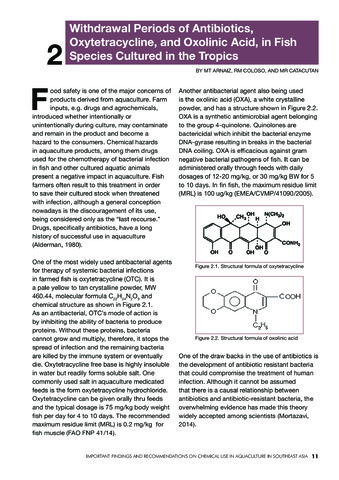Contribution of natural food and supplemental feed to the gut content of Penaeus monodon Fabricius in a semi-intensive pond system in the Philippines
Share
စိတ္တဇ
Juvenile Penaeus monodon were stocked in grow-out ponds and fed a compound diet at high rates for 19 weeks under semi-intensive conditions. At three stages of the rearing period (weeks 6, 11 and 16), the gut content of the shrimp was analysed microscopically at every hour of the day. Additionally, possible sources of natural food (lablab, lumut, zoobenthos, etc.) were analysed microscopically and where possible for proximate composition. At week 6, the gut content consisted of 28.9% supplemental feed, 42.3% plant materials (other than from the pelleted diet), 1.8% crustacean parts and 27.0% diverse detrital matter. For week 11, the percentages (same order) were 47.5%, 21.1%, 22.8%, 8.6% and for week 16, 21.7%, 34.3%, 31.7% and 12.9%, respectively. Food preference did not change with time of the day. At week 6, most feeding activity occurred at night, later, feeding activity shifted to day-time. Reduction of the maximum gut content at dissolved oxygen levels below 4 mg l−1 at night indicated a cessation of feeding in which case shrimp fed during the day-time, when dissolved oxygen levels were higher.
Suggested Citation
Focken, U., Groth, A., Coloso, R. M., & Becker, K. (1998). Contribution of natural food and supplemental feed to the gut content of Penaeus monodon Fabricius in a semi-intensive pond system in the Philippines. Aquaculture , 164(1-4), 105-116. https://doi.org/10.1016/S0044-8486(98)00180-X
ဘာသာရပ်
diet  ; feeding behaviour
; feeding behaviour  ; feeding experiments
; feeding experiments  ; food preferences
; food preferences  ; pond culture
; pond culture  ; rearing techniques
; rearing techniques  ; shrimp culture
; shrimp culture  ; stomach content
; stomach content  ; cultured organisms; Penaeus monodon
; cultured organisms; Penaeus monodon  ; Philippines
; Philippines  ; Giant tiger prawn; Semi-intensive aquaculture; Feeding pattern; Gut content analysis; Natural food; Supplemental feeding
; Giant tiger prawn; Semi-intensive aquaculture; Feeding pattern; Gut content analysis; Natural food; Supplemental feeding
 ; feeding behaviour
; feeding behaviour  ; feeding experiments
; feeding experiments  ; food preferences
; food preferences  ; pond culture
; pond culture  ; rearing techniques
; rearing techniques  ; shrimp culture
; shrimp culture  ; stomach content
; stomach content  ; cultured organisms; Penaeus monodon
; cultured organisms; Penaeus monodon  ; Philippines
; Philippines  ; Giant tiger prawn; Semi-intensive aquaculture; Feeding pattern; Gut content analysis; Natural food; Supplemental feeding
; Giant tiger prawn; Semi-intensive aquaculture; Feeding pattern; Gut content analysis; Natural food; Supplemental feeding
Taxonomic term
စုစည်းမှုများ စုစည်းမှုများ
- AQD Journal Articles [1222]
Related items
Showing items related by title, author, creator and subject.
-
Qualitative analysis of the contents of the anterior portion of the oesophagus from adult milkfish, Chanos chanos, captured in Pandan Bay from 10 May-June 1975
Villaluz, Antonio C.; Tiro, Leonardo B.; Ver, Leo M.; Vanstone, William E. (Aquaculture Department, Southeast Asian Fisheries Development Center, 1976)Qualitative analysis of food items in the anterior spiral portion of the oesophagus suggests that adult milkfish feed on both benthic and planktonic materials. -
Utilization of feed pea, Pisum sativum, meal as protein source in practical diets for juvenile shrimp, Penaeus monodon
Bautista-Teruel, Myrna N.; Eusebio, Perla S.; Welsh, Timothy P. (Elsevier, 2003)The potential of feed pea meal as an alternative protein source to soybean meal in practical diets for the juvenile tiger shrimp, Penaeus monodon, was assessed in several experiments. Six isonitrogenous diets were formulated ... -
Withdrawal periods of antibiotics, oxytetracycline, and oxolinic acid, in fish species cultured in the tropics
Arnaiz, Margarita T.; Coloso, Relicardo M.; Catacutan, Mae R. (Aquaculture Department, Southeast Asian Fisheries Development Center, 2015)Food safety is one of the major concerns of products derived from aquaculture. Farm inputs, e.g. drugs and agrochemicals, introduced whether intentionally or unintentionally during culture, may contaminate and remain in ...





